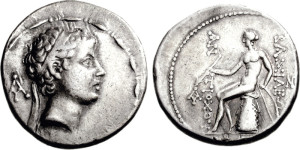 In 164 B.C.E. the Seleucids succeeded in convincing many Jews, including the Hasideans, to accept a truce and amnesty. The Hasmoneans, seeking not only religious freedom but political independence, refused to accept the amnesty. Judah seems to have lost power in this period.
In 164 B.C.E. the Seleucids succeeded in convincing many Jews, including the Hasideans, to accept a truce and amnesty. The Hasmoneans, seeking not only religious freedom but political independence, refused to accept the amnesty. Judah seems to have lost power in this period.
11-22 The king’s letter ran thus-
“King Antiochus 129 to his brother Lysias, greeting. 23 Now that our father 130 has gone on to the gods, we desire that the subjects of the kingdom be undisturbed in caring for their own affairs. 24 We have heard that the Jews do not consent to our father’s change to Greek customs but prefer their own way of living and ask that their own customs be allowed them. 25 Accordingly, since we choose that this nation also be free from disturbance, our decision is that their temple be restored to them and that they live according to the customs of their ancestors. 26 You will do well, therefore, to send word to them and give them pledges of friendship, so that they may know our policy and be of good cheer and go on happily in the conduct of their own affairs.”
27 To the nation the king’s letter was as follows-
“King Antiochus to the senate of the Jews and to the other Jews, greeting. 28 If you are well, it is as we desire. We also are in good health. 29 Menelaus has informed us that you wish to return home and look after your own affairs. 30 Therefore those who go home by the thirtieth day Xanthicus 131 will have our pledge of friendship and full permission 31 for the Jews to enjoy their own food and laws, just as formerly, and none of them shall be molested in any way for what he may have done in ignorance. 32 And I have also sent Menelaus to encourage you. 33 Farewell. The one hundred and forty-eighth year, 132 Xanthicus fifteenth.”
129. Antiochus V Eupator, ruled 164-163 B.C.E.
130. Antiochus IV.
131. March-April.
132. 164 B.C.E.